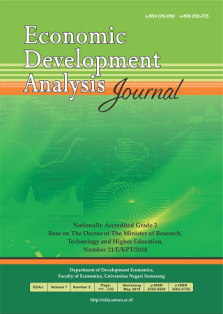The Relationship Between Economic Development and Environmental Degradation in Indonesia
Abstract
This study examines the relationship between economic growth, population growth, foreign direct investment, export, energy consumption and environmental degradation in the case of Indonesia. The time component of the dataset is 1981-2017 inclusive. The VECM Granger Causality is employed to examine causal relation between variables. The results confirm that the variables are integrated; it means that the long run relationship exists in the presence of structural break stemming in the series. The empirical findings indicate that economic growth, population growth, foreign direct investment, export and energy consumption increases CO2 emissions are the occurrence of uni-directional causality. The VECM causality analysis has shown between energy consumption and CO2 emissions are interrelated i.e. bidirectional causality. This means that an increase in energy consumption directly affects CO2 emissions and CO2 emissions also stimulate further energy consumption. This study recommends efficient consumption of energy in order to minimize energy consumptions and environment degradation in Indonesia.


